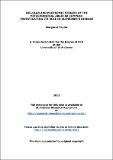Cellular and proteomic studies of the mitochondrial ABAD/Aβ complex : investigating its role in Alzheimer's disease
Abstract
The focus of this thesis is to investigate the intracellular protein-peptide complex
3-hydroxyacyl-CoA dehydrogenase (HADH), also known as ABAD (amyloid-
binding alcohol dehydrogenase) and amyloid-beta peptide (Aβ). This complex
has been identified in the development of Alzheimer's disease (AD), and this
study tries to identify if ABAD is a useful biomarker for genetic risk profiling
strategies for the early diagnosis of Alzheimer’s disease, or a suitable target for
disease-modifying drug development. The major aim of this project is to explore
the biochemical and cellular processes activated as a result of the interaction of
ABAD and Aβ. Understanding the cellular responses to these interactions could
help identify important biomarkers and/or drug targets for the diagnosis or
treatment of Alzheimer’s disease. This study assesses the cytotoxic effects of Aβ
in tissue culture and in animal models overexpressing ABAD.
An in vitro cell system using SK-N-SH cells was developed for investigating the
effects of ABAD expression in cells when incubated with synthetic Aβ peptide.
In vitro studies confirmed ABAD to be a mitochondrial protein. There were
problems with the efficiency of the synthetic Aβ peptide used, which was found
to aggregate excessively. Trial of a soluble oligomeric Aβ peptide proved to be
more efficient.
A cell system was also developed, culturing neurospheres from murine stem cells.
This proved to be a reliable system for culturing primary cells and keeping them in culture for up to 8 weeks. Cells were grown from a wild type strain and then
differentiated and stained for endogenous expression of proteins.
Proteomic studies were carried out with novel transgenic mouse models for AD.
Seven proteins were identified with changed expression in the 2x Tg mouse
model. Further immunocytochemistry of human AD brain tissue confirmed the
upregulation of peroxiredoxin II and endophilin I. Both proteins could be
returned to normal expression in the mouse models by peritoneal injection for two
weeks of a novel peptide inhibitor to ABAD, confirming the involvement of the
ABAD/Aβ complex in the increased expression of these proteins.
Finally ABAD/Aβ was investigated as a possible target for AD therapy by
screening with a small molecule fragment library. Only an initial screen was
carried out, but several small molecule compounds were found to bind to ABAD.
Further screening may produce lead compounds for a synthetic drug to inhibit the
enhanced Aβ toxicity associated with the ABAD/Aβ complex.
Type
Thesis, PhD Doctor of Philosophy
Description
Electronic version does not contain associated previously published materialCollections
Items in the St Andrews Research Repository are protected by copyright, with all rights reserved, unless otherwise indicated.

